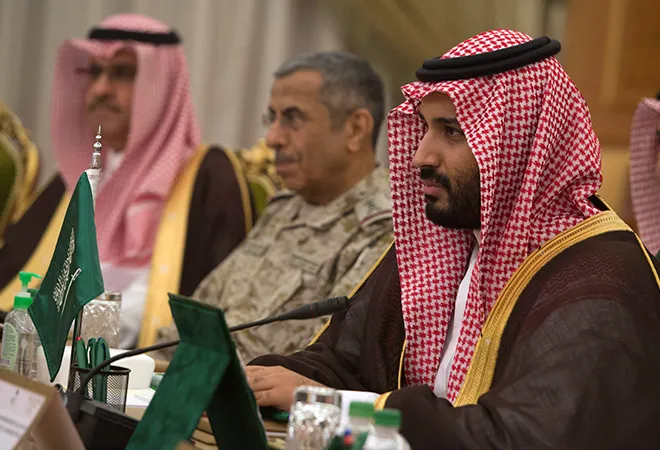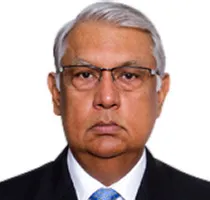A midst the deepening quagmire in the Saudi-led war in Yemen, blockade of fellow Arab neighbour Qatar and rising tension with regional rival Iran, Saudi King Salman bin Abdul Aziz Al Saud pulled a rabbit out of the hat. The king issued a royal decree nominating his youngest son, 31-year-old Muhammad bin Salman, as the new Crown Prince. This decision is not completely unexpected, but the timing is a surprise. The new Crown Prince, born in August 1985, is the king’s son from his third wife, Fahda bint Falah bin Sultan. He has also been appointed as Deputy Prime Minister. The Crown Prince is the second in line to the throne and the second most powerful post in the Saudi Kingdom. Muhammad will become the next king, if no further upheavals take place in the ruling Saudi family, said to comprise over 15,000 princes of varying importance and pedigree.
He will be the youngest in line to become king and bucks the trend of senior and aging princes ascending the throne.
A deep churn
This latest unexpected move indicates a deep churning within the Saudi Royal family.
Media reports have said that 31 out of the 34 Council of Princes approved the nomination of Muhammad. He replaces his half-brother Muhammad bin Naif whose father, Naif bin Abdul Aziz Al Saud, was the half-brother of King Salman and one of the Sudairi seven. Hassa bint Al Sudairi was one of the favourite wives, among more than a hundred, of King Abdul Aziz Al Saud, the founder of the Kingdom of Saudi Arabia.
The octogenarian Salman is in poor health and appointing his favourite son to succeed him, seems to stem from his desire to fix the succession for his progeny.
Who is Muhammad bin Salman and what explains his meteoric rise in the Saudi ruling hierarchy? Salman became king in January 2015 and soon replaced the incumbent Crown Prince Muqrin bin Abdul Aziz Al Saud who was in his seventies.
The relatively younger, Muhammad bin Naif in his fifties, was then appointed Crown Prince. This was a generational change since Muhammad bin Naif was a grandson of the Kingdom's founder and son of Salman's brother Naif, and one of the Sudairi seven. Muhammad bin Salman was appointed Deputy Crown Prince. While these relationships may get convoluted for the general reader, in the Saudi Royal family, pedigree matters.
Naif bin Abdul Aziz was a powerful interior minister and his son was also in the ministry and in charge of counterterrorism, a responsibility he took seriously. He was also at the receiving end of an assassination attempt which caused injuries not made public. Muhammad bin Naif has been divested of all responsibilities, which have been taken over by the new Crown Prince. The new Crown Prince was in charge of defence and energy, the two most important subjects after the interior ministry. The new interior minister, 34-year-old Abdulaziz bin Saud bin Naif is very close to Mohammed bin Salman. The Crown Prince will now be the all-powerful boss of all these ministries.
Muhammad bin Salman has also been an economic czar and he gave his country the 2030 Vision, which seeks to diversify revenues, imposes austerity measures and includes partial privatisation of the state owned ARAMCO, the giant oil company which has the monopoly over oil production and sales. While being young, energetic and dashing, he has dragged the Kingdom into a proxy war with Iran in Yemen that Saudi Arabia is far from winning. With oil prices hovering around USD 45, the Kingdom's revenues have plummeted putting severe strain on its budget, which comes mainly from oil exports.
The challenges ahead
Muhammad dons the mantle of Crown Prince at a time when Saudi Arabia faces huge challenges.
As defence minister, he cozied up to the Trump administration by pushing through the huge deal for defence hardware purchases from the US. The Obama administration was not in the good books of Saudi Arabia because of the nuclear deal with Iran. The Saudis and the Israelis were against the nuclear deal, which gave Iran respite from sanctions and allowed it to flex its muscles in the region.
The rapid rise of the new Crown Prince must have also angered other members of the royal family, particularly the older ones who are more experienced, equally educated and competent. The royal family tends to keep differences within the family and rewards those who fall in line with the king's decision. Hence, don't hold your breath for a revolt. The royal family tends to zealously protect its corporate interests, which has made its members fabulously wealthy. There is no public manifestation of any discord.
Saudi TV has repeatedly shown an obsequious Muhammad kissing the hand of elder cousin, the sacked Crown Prince, saying that he will continue to consult him and other elders. It is unlikely that he will toe anyone's line. In return the former Crown Prince has pledged allegiance to the new Crown Prince. By all accounts, the new Crown Prince is popular among the Saudi people, 70% of whom are in his age bracket. He has been carefully projected in the media as an industrious and ambitious leader who wants to modernise the country. A former American Ambassador has also called him impulsive.
Young Saudis, eager for change, celebrated the surprise announcement on social media. The Saudi stock exchange surged but economic and foreign policy challenges have not abated.
Regional balance
The new Crown Prince had taken the lead in war in Yemen, the blockade of Qatar and a more aggressive stance towards Iran. He is said to have spearheaded the setting up of the so-called "Sunni NATO" with the former Pakistani army chief as its commander. In Syria, he is reported to have set up the, hardline Salafi militia, Jaish Al Fatah that has allied with the Al Qaeda-affiliated Jabhat Al Nusra, to fight the Assad government. The conflict in Syria continues and has caused immense misery among fellow Muslims and Arabs. Over half the Syrian population has become refugees and over 500,000 people killed and several Syrian towns and cities destroyed.
The new Crown Prince is also known for his tirade against Iran. He has framed his animosity towards Iran in harsh sectarian rhetoric. He vowed to take the struggle inside Iranian territory. Iran had blamed him for the death of over 2,000 Iranians during the Haj pilgrimage in 2015 when his convoy created a stampede. The execution of the well-known Saudi Shia cleric Sheikh Nimr Al Nimr angered Iranians who had at the time rioted and attacked the Saudi Embassy in Tehran. That was when Saudi Arabia broke off diplomatic relations with Iran.
But his tirade against Iran has endeared him to the Trump administration. Reportedly, he is a close friend of Jared Kushner, Trump's son-in-law, no doubt built on business links. His visit to Washington and Trump's visit to Riyadh appears to have cemented ties between Riyadh and Washington.
The official statement from Washington has welcomed the new appointment. Iran has called the appointment a "soft coup".
Israeli newspaper Haaretz has called the appointment good news and alleges that he has met with Israeli officials. This may not be surprising, as the common enemy Iran has brought Israel and Saudi Arabia gradually closer. The Saudi royal family has ruled for over a century and has to adjust to new economic and security challenges thrown up by a region torn apart by war. There are new alignments underway with Russia, Iran, Turkey and Qatar closing ranks. The downing of a Syrian Air Force aircraft and Iranian Drone by American aircraft are signs of a dangerous drift that could erupt into conflict.
The new Crown Prince should heed the advice of his more experienced elders if he desires to mature into a statesman and a true leader. And since age is on his side, he could rule Saudi Arabia for many decades to come.
This commentary originally appeared in Catch News.
The views expressed above belong to the author(s). ORF research and analyses now available on Telegram! Click here to access our curated content — blogs, longforms and interviews.




 PREV
PREV


